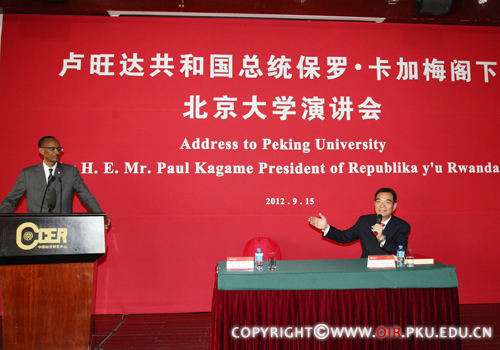Peking University, Oct. 8, 2012: Upon the invitation by Justin Yifu Lin, a former World Bank Economist and professor of Peking University (PKU), Paul Kagame, President of Republika y’u Rwanda, gave an address to PKU students on September 15, 2012.
“President Kagame is a leader of Rwanda and African country and he brought peace and prosperity to Rwanda. From 1994 to 2011, the GDP growth has been increased to 9.8% per year”, which was a miracle in Lin’s eyes.
He also said, “I was so much inspired by the people’s hope for the development in Rwanda and moved by the people’s enthusiasm for their future. Both Taiwan and mainland China were poor in the past, but the people had the similar enthusiasm for their future as the people in Rwanda and the government had the same motivation to serve the people. I’m convinced that if Taiwan can do it, Mainland can do it and Rwanda would also do it - change the nation from low income into high income within one generation to two generation.” He believed that President Kagame would be the person who will make Rwanda the miracle of African countries.

President Kagame gave a historical perspective of the relationship between China and Africa dating back to 8th-15th century by dividing it into 3 phases. China and East Africa started trade by expedition centuries ago and then China gave support to Africa in 1960’s and 1970’s, which was the second phase. The emphasis of the relationship at current phase is the mutual respect and benefit.
China and Rwanda established diplomatic relations on Nov. 12, 1971 and since then the friendly and cooperative relationship has been favorable to both countries.
He noted that China is an expanding economy, which is developing faster and has a lot of resources. “Africa is open for business and needs investment from outside in infrastructure, technologies, schools and hospitals. As a developing country, Africa should learn from China. With China and Africa making up 1/3 of the world population and a commitment towards collaboration from all involved parties, we should work together to create opportunities for the young people to fulfill their potential and bring great prosperity to our nations.”
Sharing his views on investment and education, he answered the questions from the audience. He pointed out that balancing high-speed development and people’s welfare meant both challenges and opportunities. “It is us who can make it happen and we must invest in people, knowledge and different sectors of economy, like agriculture, IT, services etc.” Regarding to the donors’ conditionality, he insisted that “for a country to develop, people should take the ownership of the development process”.
“We appreciate the help from outside, but we must lead our own process and we’ve seen it work in multiple areas including agriculture”.
Written by: Zhang Jiang